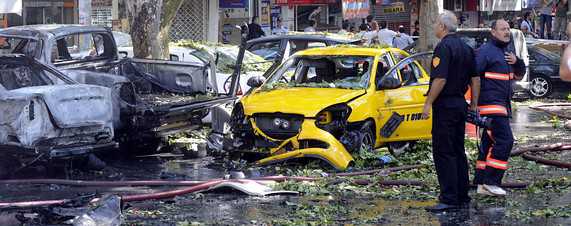By MARC CHAMPION And JOE PARKINSON

[turkey0920] European Pressphoto Agency
Turkish firemen and police officers searched the area after a blast in Ankara, Turkey on Tuesday.
ISTANBUL—A suspected car bomb that killed three people and injured 34 in the center of Turkey’s capital, Ankara, on Tuesday was a terrorist attack, the city’s chief prosecutor said.
There was no immediate claim of responsibility for the apparent bombing. However, suspicions are likely to fall on ethnic Kurdish militants who in recent weeks have come under heavy pressure from the Turkish military.
“This is considered a terrorist action because it has been done in a very public and crowded place, intended to cause great loss of life and property,” the prosecutor’s statement said.
Blast Shakes Ankara
View Slideshow
[SB10001424053111904106704576582502226580190]
Reuters
Flames engulfed a street in the capital after the explosion.
More photos and interactive graphics
There were conflicting reports about the nature of the bomb. The prosecutor’s statement said the explosion, which occurred midmorning, was caused by a fragment bomb in a car. Other officials cited witnesses who said they saw a burning gas canister fall from a window onto a liquid propane gas-fueled car, triggering the explosion.
Speaking in New York while attending a session of the United Nations General Assembly, Turkey’s Prime Minister Recep Tayyip Erdogan said there was as yet no proof that the explosion was a terrorist strike, the semi-official Anadolu news agency reported.
Interior Minister Idris Naim Sahin said the car at the center of the investigation had been bought on Sept. 13 and paid for, but not yet re-registered.
Television footage of the tree-lined street in central Ankara where the explosion took place showed cars ablaze and the windows of several nearby buildings shattered. Mr. Sahin said other cars exploded after catching fire because they too were LPG-fueled.
After the blast, a pall of smoke rose from Kumrular Avenue in the capital’s Cankaya neighborhood, a part of town where many municipal offices and the presidential palace are located.
Mr. Sahin said nobody in the street was killed by the explosion, but that three people in the surrounding buildings were killed. It wasn’t immediately clear how they died. Five of the wounded were in serious condition, Mr. Sahin said.
Turkey is engaged in a major military campaign against the Kurdish Workers’ Party, or PKK, a militant Kurdish group that has been fighting the Turkish state since 1984. Turkish aircraft have been bombing the PKK’s base in the mountains of northern Iraq since August. Turkish newspapers have been filled with speculation about a possible land assault to follow.
At the same time, Iran has been conducting a major land campaign against the PKK’s Iranian-Kurdish wing, known as PJAK, since July. Mr. Erdogan told reporters last week that Turkey may cooperate with Iran against the PKK and that he would talk to the Iranian president, Mahmoud Ahmadinejad, in the margins of the U.N. meeting.
On Monday, the PKK’s wider Kurdish Freedom Movement issued a statement accusing the Turkish state of moving to a policy of “annihilation” against it and ethnic Kurds in general. An estimated 18% of Turkey’s population are ethnic Kurds and many are agitating for greater cultural and political rights, although by no means all support the PKK.
“The Kurdish Freedom Movement and Kurdish people therefore have entered this period with a high degree of decisiveness to defend itself and to resist at all levels,” the statement said.
The PKK at times has carried out terrorist campaigns against civilians, but in recent years it has focused mainly on police and military personnel. At the same time, however, a PKK splinter group calling themselves the Kurdish Freedom Falcons have threatened to attack civilians.
Analysts critical of the government’s military campaign in northern Iraq say it may fail to eradicate the PKK, as previous efforts have failed, while encouraging PKK supporters to take the fight to the streets of Turkey’s cities and tourist resorts. Some 30 million tourists now visit Turkey each year, according to the government, representing a major source of income.
Hundreds of thousands of ethnic Kurds live in Turkish cities such as Istanbul and Ankara, many of them displaced by scorched-earth tactics the military used against the PKK in eastern Turkey during the 1990s.
Write to Marc Champion at [email protected] and Joe Parkinson at [email protected]
via Blast Shakes Turkish Capital – WSJ.com.

Leave a Reply